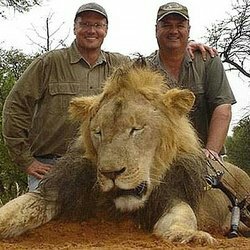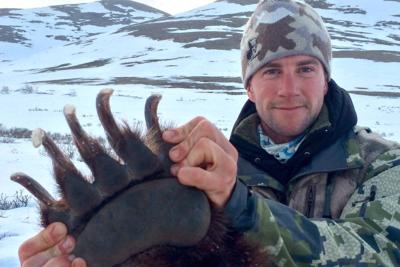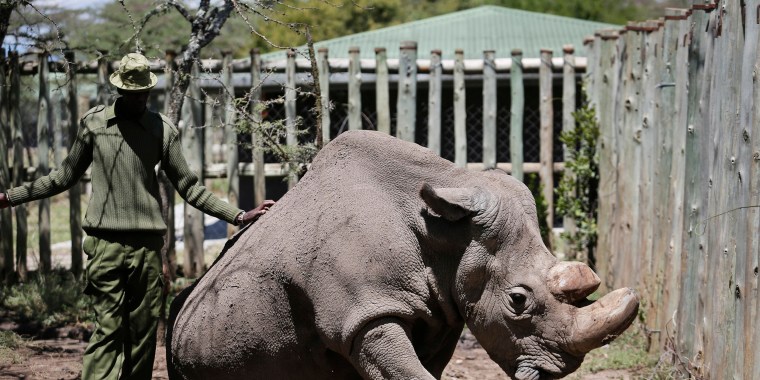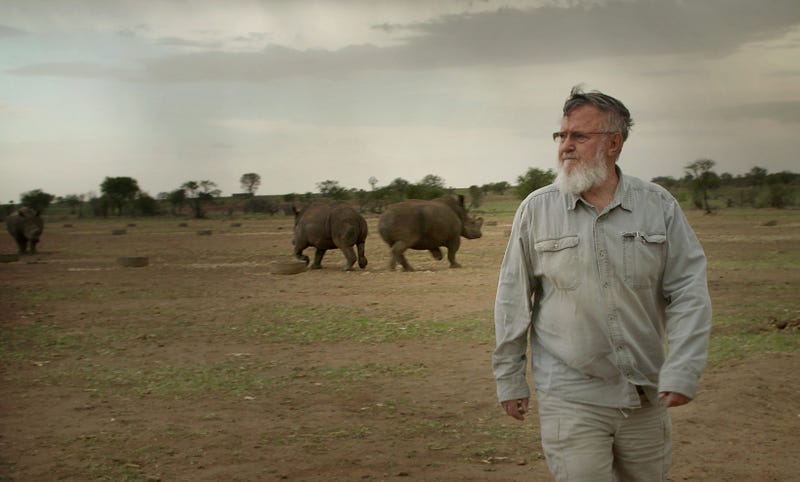
(AP) — A new U.S. advisory board created to help rewrite federal rules for importing the heads and hides of African elephants, lions and rhinos is stacked with trophy hunters, including some members with direct ties to President Donald Trump and his family.
A review by The Associated Press of the backgrounds and social media posts of the 16 board members appointed by Interior Secretary Ryan Zinke indicates they will agree with his position that the best way to protect critically threatened or endangered species is by encouraging wealthy Americans to shoot some of them.
One appointee co-owns a private New York hunting preserve with Trump’s adult sons. The oldest son, Donald Trump Jr., drew the ire of animal rights activists after a 2011 photo emerged of him holding a bloody knife and the severed tail of an elephant he killed in Zimbabwe.
The first meeting of the International Wildlife Conservation Council was scheduled for Friday at the Interior Department’s headquarters in Washington. Council members aren’t being paid a salary, though the department has budgeted $250,000 in taxpayer funds for travel expenses, staff time and other costs.
Trump has decried big-game hunting as a “horror show” in tweets. But under Zinke, a former Montana congressman who is an avid hunter, the Fish and Wildlife Service has quietly moved to reverse Obama-era restrictions on bringing trophies from African lions and elephants into the United States.
Asked about the changes during a congressional hearing Thursday, Zinke said no import permits for elephants have been issued since the ban was lifted earlier this month. The Fish and Wildlife Service said permits for lion trophies have been issued since October, when imports from Zimbabwe and Zambia were first allowed, though they could not immediately provide a number for how many.
A licensed two-week African hunting safari can cost more than $50,000 per person, not including airfare, according to advertised rates. Advocates say money helps support habitat conservation and anti-poaching efforts in some of the world’s poorest nations, and provides employment for local guides and porters.
In a statement last year, Zinke said, “The conservation and long-term health of big game crosses international boundaries. This council will provide important insight into the ways that American sportsmen and women benefit international conservation from boosting economies and creating hundreds of jobs to enhancing wildlife conservation.”
But environmentalists and animal welfare advocates say tourists taking photos generate more economic benefit, and hunters typically target the biggest and strongest animals, weakening already vulnerable populations.
There’s little indication dissenting perspectives will be represented on the Trump administration’s conservation council. Appointees include celebrity hunting guides, representatives from rifle and bow manufacturers, and wealthy sportspeople who boast of bagging the coveted “Big Five” — elephant, rhino, lion, leopard and Cape buffalo.
Most are high-profile members of Safari Club International and the National Rifle Association, groups that have sued the Fish and Wildlife Service to expand the list of countries from which trophy kills can be legally imported.
They include the Safari Club’s president, Paul Babaz, a Morgan Stanley investment adviser from Atlanta, and Erica Rhoad, a lobbyist and former GOP congressional staffer who is the NRA’s director of hunting policy.
Bill Brewster is a retired Oklahoma congressman and lobbyist who served on the boards of the Safari Club and the NRA. An NRA profile lauded Brewster and his wife’s five decades of participation and support for hunting, and his purchase of a lifetime NRA membership for his grandson when the boy was 3 days old.
Also on the board is Gary Kania, vice president of the Congressional Sportsmen’s Foundation, a group that lobbies Congress and state governments on issues affecting hunters and fishermen.
Zinke described the purpose of the council as representing the “strong partnership” between federal wildlife officials and those who hunt or profit from hunting. Council paperwork said the panel’s mission was “to increase public awareness domestically regarding conservation, wildlife law enforcement, and economic benefits that result from United states citizens traveling to foreign nations to engage in hunting.”
In its charter, the council’s listed duties include “recommending removal of barriers to the importation into the United States of legally hunted wildlife” and “ongoing review of import suspension/bans and providing recommendations that seek to resume the legal trade of those items, where appropriate.”
In a letter this week, a coalition of more than 20 environmental and animal welfare groups objected that the one-sided makeup of the council could violate the Federal Advisory Committee Act, which requires government boards to be balanced in terms of points of view and not improperly influenced by special interests. The groups said they nominated a qualified representative, but Zinke didn’t select him.
“If Trump really wants to stop the slaughter of elephants for trophies, he should shut down this biased, thrill-kill council,” said Tanya Sanerib, a spokeswoman for the Center for Biological Diversity. “The administration can’t make wise decisions on trophy imports if it only listens to gun-makers and people who want to kill wildlife.”
Interior Department spokeswoman Heather Swift said the makeup of the council fully complies with the law.
“There are members on the council that represent all areas of conservation and varying opinions,” Swift said.
CONNECTIONS TO TRUMP
Among Zinke’s appointees is Steven Chancellor, a longtime Republican fundraiser and chairman of American Patriot Group, an Indiana-based conglomerate that includes a company that supplies Meals Ready to Eat to the U.S. military.
According to Safari Club member hunting records obtained in 2015 by the Humane Society, Chancellor has logged nearly 500 kills — including at least 18 lions, 13 leopards, six elephants and two rhinos.
In early 2016, records show Chancellor filed for a federal permit to bring home the skin, skull teeth and claws from another male lion he intended to kill that year in Zimbabwe, which at the time was subject to an import ban imposed by the Obama administration.
Later that same year, Chancellor hosted a private fundraiser for then-candidate Trump and Mike Pence at his Evansville, Indiana, mansion, where the large security gates leading up the driveway feature a pair of gilded lions.
Chancellor did not respond to a phone message seeking comment on Thursday.
In the fight to win approval for imports of lions from Zimbabwe, Chancellor was represented by Conservation Force, a non-profit law firm in Louisiana. It was founded by John Jackson III, a lawyer and past Safari Club president who also has been appointed to the advisory council by Zinke.
Chris Hudson, a lawyer and past president of the Dallas chapter of the Safari Club, also was appointed. He made headlines in 2014 when the club auctioned off a permit for $350,000 to kill an endangered black rhino in Namibia. Hudson later joined with Jackson in providing legal representation to the winning bidder, who sued Delta after the airline refused to fly the rhino’s carcass back to the United States.
‘HUNTING LIFESTYLE’
Appointees include professional hunters. Peter Horn is an ex-vice president of the Safari Club International Conservation Fund and a vice president for high-end gun-maker Beretta. He runs the company’s boutique in Manhattan, where well-heeled clients can drop as much as $150,000 for a hand-engraved, custom-made shotgun.
Horn wrote in his 2014 memoir that he co-owns a hunting property in upstate New York with Trump Jr. that has a 500-yard range “put together” by Eric Trump.
The AP reported last month that the Trump sons were behind a limited-liability company that purchased a 171-acre private hunting range in the bucolic Hudson Valley in 2013, complete with a wooden tower from which owners and their guests shoot at exploding targets.
Horn did not respond to a message seeking comment.
Trump Jr. also is friendly with another member of the advisory council — hunting guide and TV show personality Keith Mark. He helped organize Sportsmen for Trump during the 2016 presidential campaign and recently posted photos on his Twitter page of himself with Trump Jr. and Zinke, standing before an array of mounted big-horn sheep and a bear.
“I see the world from a hunting lifestyle,” Mark told the AP, adding that he has no preconceived agenda for his service on the conservation council. “It’s the most pure form of hands on conservation that there is. I will approach all decision-making with my background.”
Also named to the board is Cameron Hanes, a celebrity archer who advocates for trophy hunting. In a podcast last month, he said hunting allows animals such as elephants to “have value.”
But while supportive of African trophy hunting as an aid to conservation, he said he is more interested in North American wildlife management and sees the council as a way to represent hunters’ interests. He said he hopes to take Zinke out to the archery range.
“We’re trying to make that happen,” he said. “If you have somebody’s ear, you want to tell them what’s important to you.”
Hanes also said he knows Trump Jr. and has been speaking with him about hunting for “quite a while.”
EXTREME HUNTRESS
Also on the council is Olivia Opre, a TV personality and former Miss America contestant who received Safari Club’s top prize for female hunters, the Diana Award.
Opre, who co-produces a competition called Extreme Huntress, has killed about 90 different species on six continents, bringing home some 150 animal carcasses. Many are stuffed and mounted in her house, she told the British newspaper The Telegraph in 2016.
“I’m tired of hearing the words ‘trophy hunter’,” she told the paper. “We’re helping to preserve wildlife; we hunt lions because we want to see populations of wildlife continue to grow.”
Opre, who did not respond to messages seeking comment, has previously recounted killing a hippo, buffalo, black rhino and lion, all in Africa.
She said in the NRA’s Women’s Leadership Form newsletter published last year that she and another Diana Award winner, Denise Welker, had “shed tears over her appreciation for life in all its forms.”
Welker also has been appointed to the conservation council. She shot and killed an African elephant from just five paces away, according to a blog post on the Safari CIub-affiliated site, Hunt Forever. Included was a photo of a smiling Welker posing next to the carcass of the big bull, a large bullet hole visible between its eyes.
She also has hunted animals across the U.S., in Mexico, New Zealand and Cameroon, posting photos of herself with a dead leopard, eland and Greenland musk ox, according to a post she wrote on Hunt Forever three years ago.
On the website scout.com, Gayne Young wrote that he hunted elephants with Denise, her husband, Brian, and hunter and tracker Ivan Carter in Botswana in 2013.
Carter — a British citizen who runs a non-profit anti-poaching initiative alongside his guide business — also was appointed to the conservation council. He is a Rhodesian-born professional hunting guide who resides in the Bahamas. On social media postings, he has said banning elephant imports does not reduce how many elephants are hunted, and wrote an article after the infamous shooting of Cecil the Lion in Zimbabwe declaring that anti-hunting forces were on the march.
“This event and the subsequent events have been the ‘Twin Towers’ of the hunting world — our 9-11,” he wrote in a 2016 article, deploring airlines’ move to stop accepting hunting trophies as air cargo. He proposed fighting back in a war of public opinion, with hunters as infantrymen, organizations like Safari Club International as generals and the pro-hunting media as “a machine gun that can spew thousands of bullets into the opposition’s fighting force.”
In an interview with AP on Thursday, he described himself as a conservationist first and a hunter second. He said he did not have a problem with the council’s membership skewing toward trophy hunters.
“They are what makes the wheel turn in the form of bringing big dollars” to conservation, he said. Without trophy-hunting revenue, the governments of African nations will turn over conservation land to private interests for development, he said.
“The business model doesn’t work with the closure of lion and elephant imports,” he said.
The Fish and Wildlife Service declined to provide information on Thursday on whether any appointees to the advisory committee had applied for or received import permits for animal trophies over the last year. Agency spokesman Gavin Shire suggested filing a Freedom of Information Act request for copies of the permits, a process that can take years.
ANIMAL EXPERTS
One of two non-hunters named to the board is Terry Maple, a former director of the Atlanta zoo. Legally importing rare live animals also requires government permits issued by Fish and Wildlife. Maple helped write “A Contract with the Earth,” a book by Newt Gingrich making the politically conservative case for environmentalism.
The other is Jenifer Chatfield, a zoo and wildlife veterinarian professor who has family ties to the exotic animal trade.
The book “Animal Underworld: Inside America’s Black Market for Rare and Exotic Species” accused her father, John Chatfield, of diverting zoo animals to the private market, where they would become pets or stock private hunting ranches.
In one 1997 instance — reported by the AP — the elder Chatfield ended up in possession of endangered lemurs and pronghorn antelopes that were to have gone to a zoo in Indiana. Simultaneously, Chatfield listed lemurs and pronghorn antelope for sale in a publication called “Animal Finders.”
An investigation of the zoo director’s activities resulted in his expulsion from the American Zoological Association. Chatfield denied any wrongdoing at the time. He did not respond to a request for comment from the AP on Thursday.
The Chatfield family since has moved to Dade City, Florida, where they operate a facility housing nearly 200 exotic animals that state business records show Jenifer partly owns. In 2013, Florida Fish and Wildlife officials cited the farm for improperly storing kangaroos after one escaped, then died after being tranquilized and shocked by sheriff’s deputies. According to the state’s report, Chatfield initially denied that the kangaroo was his — but accepted responsibility after the fish and wildlife inspector proposed DNA testing. The inspector noted that Chatfield was unable to say how many kangaroos he currently had.
Though Jenifer Chatfield is a part owner of the exotic animal facility and was present at the time of the kangaroo escape, state wildlife officials did not cite her for a violation along with her father.
She did not return messages seeking comment.
Pearson reported from New York.
Follow Associated Press investigative reporters Biesecker at http://twitter.com/mbieseck , Pearson at http://twitter.com/JakePearsonAP and Horwitz at http://twitter.com/JeffHorwitz









 Judy and Hank Konrad pose with a greater kudu bull, a woodland antelope, taken for meat in Botswana last year while they were hunting in the Kalahari. Photo courtesy of Hank Konrad
Judy and Hank Konrad pose with a greater kudu bull, a woodland antelope, taken for meat in Botswana last year while they were hunting in the Kalahari. Photo courtesy of Hank Konrad A male Himalayan Tahr, a wild goat with a lion-like mane, watches over grocery shoppers. Konrad shot it in New Zealand, where Tahr goats are hunted for meat. Photo by Karen West
A male Himalayan Tahr, a wild goat with a lion-like mane, watches over grocery shoppers. Konrad shot it in New Zealand, where Tahr goats are hunted for meat. Photo by Karen West Hank Konrad displays an 84-pound elephant tusk, one of the pair he has from his 2012 hunt in Botswana. Since the mid-1980s all elephant tusks being shipped from Africa are assigned a serial number to help track the ivory. Hunters must have permits and document their hunts with photographs. Konrad donates the hide and all meat to local villagers. Photo by Karen West
Hank Konrad displays an 84-pound elephant tusk, one of the pair he has from his 2012 hunt in Botswana. Since the mid-1980s all elephant tusks being shipped from Africa are assigned a serial number to help track the ivory. Hunters must have permits and document their hunts with photographs. Konrad donates the hide and all meat to local villagers. Photo by Karen West About two dozen white tail and mule deer trophies are on display above the freezer cases. Photo by Karen West
About two dozen white tail and mule deer trophies are on display above the freezer cases. Photo by Karen West


